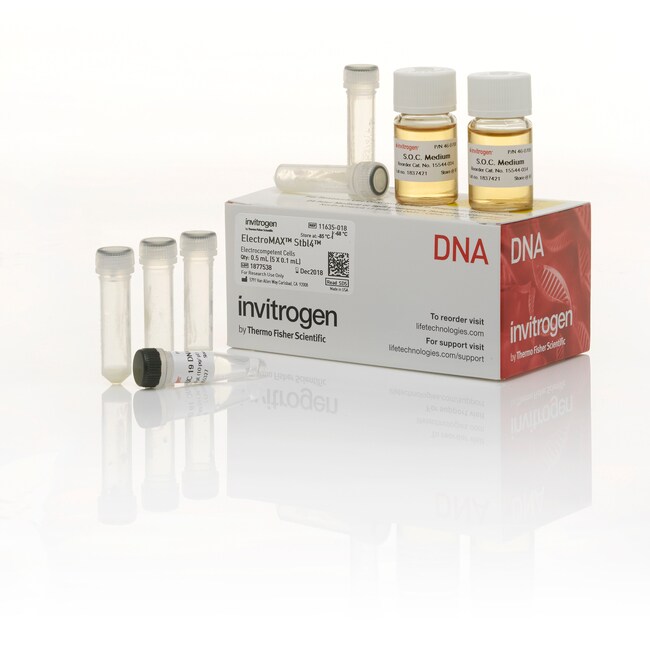
ElectroMAX Stbl4 Competent Cells are specifically designed for cloning unstable inserts. This strain is a derivative of Stbl2 cells (engineered from JM109/J5 strain). To improve performance, the gal- mutation was introduced, lon- restored to wild type lon+ allele, and F′ episome introduced. The Stbl4 strain retains the genetic properties of the Stbl2 strain for the maintenance of unstable inserts such as retroviral sequences, direct repeats, and tandem array genes. In addition, the Stbl4 strain is reportedly used in discovery of complex secondary metabolites and CRISPR library construction and maintenance.
As electrocompetent cells, Stbl4 cells can achieve high transformation efficiency of >5 x 109 cfu/μg, making them ideal for challenging applications such as generating cDNA, CRISPR, and genomic libraries of unstable inserts or using low DNA input. Electrocompetent Stbl4 cells are able to take up and maintain large plasmids (e.g., 50 kb cosmids and 100–200 kb P1 clones). Stbl4 cells also contain an F' episome, allowing them to serve as a host for single-stranded DNA such as M13mp cloning vectors if a lawn of DH5αF′IQ is provided to allow plaque formation. The lacZΔM15 marker provides α-complementation of the β-galactosidase gene from pUC or similar vectors and can therefore be used for blue-white screening of colonies on agar plates containing X-gal or Bluo-gal and IPTG. The mcrA mutation and the mcrBC-hsdRMS-mrr deletion allow cloning of genomic sequences that are methylated. Finally, the endA1 mutation greatly increases plasmid yield and quality.
ElectroMAX Stbl4 competent cell features
• Provide transformation efficiencies of >5 x 109 cfu/μg
• Unique genotype stabilizes direct repeats and retroviral sequences
• The mcrA mutation and mcrBC-hsdRMS-mrr deletion allows cloning methylated genomic sequences
• Support of blue-white screening of recombinant clones due to lacZΔM15
• Designed to deliver high-yield plasmid preparations for downstream applications
• Stable F' episome allows isolation of ssDNA
Propagating unstable and large DNA with high transformation-efficiency cells
Many competent cell strains have the recA1 genotype, which reduces recombination. However, there are some instances when the DNA that you are trying to clone is still unstable in such cells, perhaps due to the presence of inverted or direct repeats or GC-rich tracts. While such sequences are relatively common in eukaryotic genomes, they are rare in E. coli. Consequently, rearrangements may occur when these sequences are introduced into standard E. coli strains.
Genotype: mcrA Δ(mcrBC-hsdRMS-mrr) recA1 endA1 gyrA96 gal–thi-1 supE44 λ–relA1 Δ(lac-proAB) / F′ [proAB+lacIqZΔM15 Tn10(TetR)]
Find the strain and format that fits your needs
Stbl strains are available with a variety of genetic background.
The Stbl3 strain is available in MultiShot format for high throughput applications.
MAX Efficiency DH5αF´IQ Competent Cells are available in chemically competent format.
Explore bacterial growth media formats
Notes
• To maximize stabilization of direct repeats and retroviral sequences, incubate Stbl4 cells and perform expression studies at 30°C.
• A high-voltage electroporation apparatus is required.
• Stbl4 strain genome sequences are available in the NCBI GenBank database under accession numbers CP076043.1 and CP076044.1 (Assad et al. 2021).
| Code | Description |
|---|---|
| 11635018 | Catalog Number: 11635018 |

